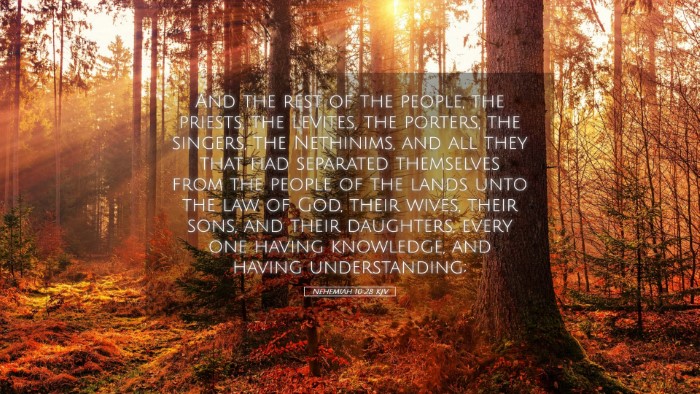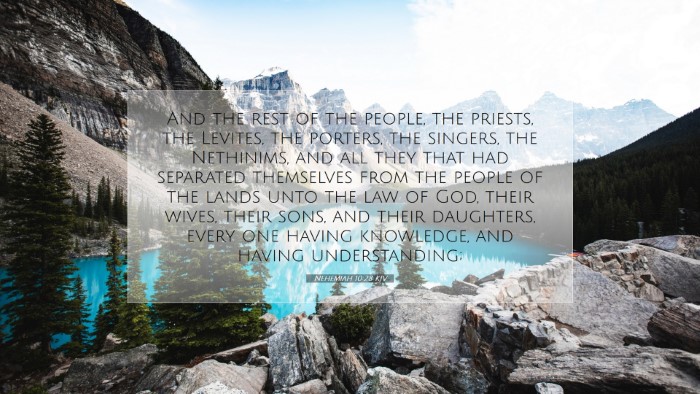Commentary on Nehemiah 10:28
Nehemiah 10:28 states: "And the rest of the people, the priests, the Levites, the porters, the singers, the Nethinims, and all they that had separated themselves from the people of the lands unto the law of God, their wives, their sons, and their daughters, everyone having knowledge and having understanding." This verse highlights a crucial moment in Israel's history during the post-exilic period, focusing on the commitment of the people to separate themselves unto the Lord.
Contextual Overview
This chapter is part of a broader narrative where the Israelites, upon the reading of the Law by Ezra, express their desire to return to covenant faithfulness. The historical backdrop includes the return from Babylonian exile and the rebuilding of Jerusalem’s walls.
Nehemiah, as a leader, focuses not only on the physical reconstruction of the city but also on the spiritual renewal of its inhabitants. This verse emphasizes the communal commitment to God that involves every segment of society.
Detailed Commentary
1. The Collective Body of Believers
Matthew Henry emphasizes that the phrase "the rest of the people" signifies those individuals who were not directly involved in the leadership or priestly roles but were nonetheless vital to the community’s spiritual life. This inclusivity suggests a complete dedication of all social strata to the Law.
Albert Barnes notes that the mention of "priests, Levites, porters, singers, and Nethinims" represents various religious functions within the community. Each group plays a critical role in worship and the maintenance of spiritual order, underscoring that worship is a communal effort involving diverse roles.
2. Separation for Holiness
Adam Clarke points out the phrase "separated themselves from the people of the lands" speaks of a conscious decision to leave behind the corrupting influences of surrounding nations. This act of separation is fundamental to their identity as God’s chosen people and signifies a restoration to holiness, aligning with Old Testament principles of covenant fidelity.
Clarke elaborates that this separation is both physical and moral; they not only remove themselves from idolatrous practices but also commit to live according to God’s Law. This encourages community purity and devotion, critical in rebuilding their national identity.
3. Emphasis on Knowledge and Understanding
The verse also mentions "everyone having knowledge and having understanding," which Matthew Henry interprets as indicating that this commitment is made with conscious acknowledgment and comprehension of the Law. It underscores the importance of teaching and understanding scripture within the community.
Barnes further explains that this knowledge is not mere intellectual assent but is essential for authentic engagement with the covenant. The community's leaders and influencers must ensure that the people are instructed in the ways of the Lord, fostering a culture of spiritual literacy.
4. Implications for Family and Society
Nehemiah's mention of "wives, sons, and daughters" illustrates the familial scope of this commitment. It reflects the Israelites’ recognition of the need for collective faithfulness, emphasizing the responsibility of parents to cultivate faith in their children.
Henry comments on the generational implications of this initiative. Just as they are called to separate themselves, they must also educate and instill these values in the younger generation to ensure the continuity of faith and obedience to God’s statutes.
Theological Reflection
This verse serves not only as a historical account but a theological reflection on community, separation, and spiritual renewal. The Israelites' covenant renewal is a model for contemporary churches seeking to navigate cultural influences while remaining faithful to biblical teaching.
In the modern context, this separation is mirrored in the call of Christians to be "in the world but not of the world" (John 17:14-16). The passage urges believers to evaluate what influences they allow into their lives and emphasizes the necessity of a knowledgeable faith that informs their actions.
Practical Applications
- Community Prayer and Commitment: Pastors and church leaders can encourage collective prayer meetings to affirm a community's commitment to living by God’s word.
- Family Discipleship: Churches might implement family-oriented discipleship programs that promote understanding of scripture within familial settings.
- Education in the Word: Seminaries and Bible colleges can prioritize teaching methods that foster not just knowledge but deeper understanding of scripture among students.
- Cultural Engagement: Ministries can develop resources that assist individuals in navigating cultural challenges while staying true to biblical principles.
Conclusion
Nehemiah 10:28 calls God’s people to a profound commitment to His Law, highlighting the necessity of knowledge, communal responsibility, and separation from the influences of a secular world. As pastors, students, and theologians reflect on this verse, they are reminded of the enduring call to holiness and the importance of instructing future generations in the ways of the Lord.


